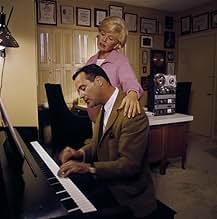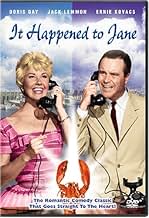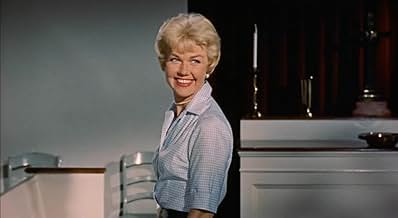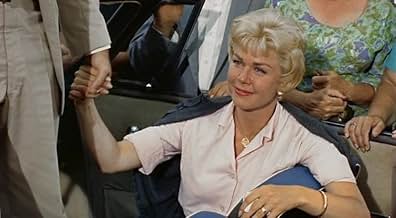IMDb-BEWERTUNG
6,5/10
3288
IHRE BEWERTUNG
Jane Osgood betreibt ein Hummergeschäft, mit dem sie ihre beiden kleinen Kinder unterstützt.Jane Osgood betreibt ein Hummergeschäft, mit dem sie ihre beiden kleinen Kinder unterstützt.Jane Osgood betreibt ein Hummergeschäft, mit dem sie ihre beiden kleinen Kinder unterstützt.
Max Showalter
- Selwyn Harris
- (as Casey Adams)
Robert Paige
- Bob Paige - Host 'The Big Payoff'
- (as Bob Paige)
Empfohlene Bewertungen
This is a fun period movie. It's a great snap shot of rural New England in the late 1950's. I remember watching this movie when I was a young boy growing up in the Hartford area of Connecticut. Thought the story is about the fictitious town, Cape Anne, Maine, the story was actually filmed in Connecticut. I remember everyone being excited about the movie because they had filmed scenes at the Hartford Railroad Station, one being where George kisses Jane. Back then we all had traveled someplace from the Hartford Station. The movie's vivid color gives us great views of the landscape, the old New England houses, stores, churches, and court house. The "Town Meeting" as it was, and still is, in some ways still in Maine, New Hampshire, and Vermont. The various types of cars of the time, and of course the different trains. It's a great story of the little guy (gal in this case) against the big corporation. Doris Day and Jack Lemmmon are at their best as well as the supporting cast. This is a movie the whole family can sit down to and have a great time, especially if you are from New England.
This has to be the most underrated and overlooked of the comedies from Doris Day's later career. I'm surprised at the relatively low score it has received here on IMDb, as it's a really fun and entertaining movie (particularly following the unfortunate Tunnel of Love she appeared in the prior year).
Rather than the lush, opulent interiors and wardrobe we usually look forward to in a Day comedy, this one is stunning for its exteriors. Filmed in New England in the summer of 1958, the film exudes idyllic small town splendor. Day plays Jane Osgood, a widowed entrepreneur (all "independent" women in 1950's TV or movies are either widows, as in Lucille Ball's later television work, or impossible-to-marry shrews like Joan Crawford in The Best of Everything). Osgood operates a budding lobster business, and when an expensive shipment is ruined by the laxity of the railroad, she takes on railroad magnet Harry Foster Malone in a highly publicized David & Goliath lawsuit. Ernie Kovacs is particularly memorable in his portrayal of Harry Foster Malone, an obvious and amusing allusion to Orson Welles' Charles Foster Kane, which was of course an allusion to William Randolph Hurst. In her legal battle, Osgood enlists the aid of local attorney and old friend George Denham, the man she's "supposed" to be with and just doesn't realize it, played well by a young Jack Lemmon. Throughout the course of the story, the film seems to at regular intervals inject some rather insightful observations on a multitude of thought-provoking topics, including the place and nature of democracy in a capitalist society, the overwhelming power wielded by big business, even the (at the time) ever expanding place of television in our lives and its ability to influence and inform. And all of this in a comedy!
The only negative I can think of is the inclusion of perhaps the worst musical number ever put on film. Jane Osgood is the den mother of the local boy-scout troop (naturally) and at the camp out in her back yard she leads them in a sing-a-long of the single most stupid, dreadful and endless song you ever heard in your life. "Be Prepared" well they warned you! It starts out as amusingly bad, but then seems to last about fifteen or twenty minutes until you think you'd rather take your own life than hear one more note. Any self-respecting boy scout over the age of five would kick you right in the nuts if you asked him to sing this wretched torturous piece of nonsense.
This aside (it is unfortunately not that uncommon in films of this era), this film benefits well from a strong, well written script and an excellent cast. It is actually much more intelligent and heart-warming than any of the Doris Day-Rock Hudson pairings, and while it is a very different kind of film, it can hold its own against any of those. Highly recommended, but be prepared to hit the "mute" button when those boy-scouts start singing!
Rather than the lush, opulent interiors and wardrobe we usually look forward to in a Day comedy, this one is stunning for its exteriors. Filmed in New England in the summer of 1958, the film exudes idyllic small town splendor. Day plays Jane Osgood, a widowed entrepreneur (all "independent" women in 1950's TV or movies are either widows, as in Lucille Ball's later television work, or impossible-to-marry shrews like Joan Crawford in The Best of Everything). Osgood operates a budding lobster business, and when an expensive shipment is ruined by the laxity of the railroad, she takes on railroad magnet Harry Foster Malone in a highly publicized David & Goliath lawsuit. Ernie Kovacs is particularly memorable in his portrayal of Harry Foster Malone, an obvious and amusing allusion to Orson Welles' Charles Foster Kane, which was of course an allusion to William Randolph Hurst. In her legal battle, Osgood enlists the aid of local attorney and old friend George Denham, the man she's "supposed" to be with and just doesn't realize it, played well by a young Jack Lemmon. Throughout the course of the story, the film seems to at regular intervals inject some rather insightful observations on a multitude of thought-provoking topics, including the place and nature of democracy in a capitalist society, the overwhelming power wielded by big business, even the (at the time) ever expanding place of television in our lives and its ability to influence and inform. And all of this in a comedy!
The only negative I can think of is the inclusion of perhaps the worst musical number ever put on film. Jane Osgood is the den mother of the local boy-scout troop (naturally) and at the camp out in her back yard she leads them in a sing-a-long of the single most stupid, dreadful and endless song you ever heard in your life. "Be Prepared" well they warned you! It starts out as amusingly bad, but then seems to last about fifteen or twenty minutes until you think you'd rather take your own life than hear one more note. Any self-respecting boy scout over the age of five would kick you right in the nuts if you asked him to sing this wretched torturous piece of nonsense.
This aside (it is unfortunately not that uncommon in films of this era), this film benefits well from a strong, well written script and an excellent cast. It is actually much more intelligent and heart-warming than any of the Doris Day-Rock Hudson pairings, and while it is a very different kind of film, it can hold its own against any of those. Highly recommended, but be prepared to hit the "mute" button when those boy-scouts start singing!
It Happened to Jane presents Doris Day as a woman on a mission. She's inherited a lobster business from her late husband and due to some cost cutting on the railroad that President Ernie Kovacs has put through, her lobsters were dead on arrival at their destination.
I'd be burned up as well and Doris and lawyer Jack Lemmon sue the railroad. They win a nominal sum, but that ain't good enough. They both carry on the fight and she becomes a media star. Kind of like a Fifties version of Erin Brockovich.
Of course all of this is done at the incredible stupidity and abominable sense of public relations that Ernie Kovacs has. His character is yet another version of Al Capp's General Bullmoose. And that character was a satire on Eisenhower's first Defense Secretary Charles E. Wilson. Wilson at his confirmation hearings uttered that never to be forgotten phrase that he had always operated on the principle that what was good for General Motors was good for the USA. Wilson was a fatuous sort of gent, just like Ernie Kovacs here. I'd have to say Kovacs was having a whale of a good time in this part.
The movie had some nice location shooting which definitely helped. And I completely agree with the previous reviewer who said that Lemmon and Day meshed nicely together as a team. It is a pity they weren't ever teamed again.
A favorite character part in the film for me is Russ Brown who plays Day's uncle and a former railroad engineer, a fact that comes in handy during the climax of the film.
It's a nice family film, but it also gets in a few good satirical shots at American business types.
I'd be burned up as well and Doris and lawyer Jack Lemmon sue the railroad. They win a nominal sum, but that ain't good enough. They both carry on the fight and she becomes a media star. Kind of like a Fifties version of Erin Brockovich.
Of course all of this is done at the incredible stupidity and abominable sense of public relations that Ernie Kovacs has. His character is yet another version of Al Capp's General Bullmoose. And that character was a satire on Eisenhower's first Defense Secretary Charles E. Wilson. Wilson at his confirmation hearings uttered that never to be forgotten phrase that he had always operated on the principle that what was good for General Motors was good for the USA. Wilson was a fatuous sort of gent, just like Ernie Kovacs here. I'd have to say Kovacs was having a whale of a good time in this part.
The movie had some nice location shooting which definitely helped. And I completely agree with the previous reviewer who said that Lemmon and Day meshed nicely together as a team. It is a pity they weren't ever teamed again.
A favorite character part in the film for me is Russ Brown who plays Day's uncle and a former railroad engineer, a fact that comes in handy during the climax of the film.
It's a nice family film, but it also gets in a few good satirical shots at American business types.
Entertaining A-budget production, but too plot-heavy to really succeed as a comedy, despite the heavyweight talents of Lemmon, Kovacs, Day, and director Quine. In short, the comedic moments have to compete with too many plot developments in a screenplay more seriously complex than most comedy set-ups. Strong-willed Day is determined not to be bested by railroad tyrant Kovacs in getting her lobster business going. Throw in a romantic triangle and Lemmon's political ambition and you've got a crowded storyline. Nonetheless, all the principals are in fine form—Day's all sunny spunk, Lemmon's a slightly pixilated attorney, while Kovacs does his usual moustache-twirling villain.
As entertaining as these characters are, the movie really succeeds as a slice of idealized Americana. Whoever decided to film in an actual New England small town and use the residents for the many crowd scenes deserves a medal. The resulting visuals are a permanent record of small town America at mid-century and wonderfully colorful to look at. There's a bit of Norman Rockwell nostalgia in some of the set-ups that could have come off a Saturday Evening Post cover, especially those around the train station. And what could be more popularly American than the little guy (gal) besting the big guy at his own game. I just wish the script had eliminated the unnecessary and non-comedic Day/Forrest subplot, and instead mixed in more interaction between Kovacs and Lemmon whose chemistry is superb as shown in the under-rated Operation Mad Ball (1957). Nonetheless, there are enough compensations to make this a very watchable 90 minute diversion.
As entertaining as these characters are, the movie really succeeds as a slice of idealized Americana. Whoever decided to film in an actual New England small town and use the residents for the many crowd scenes deserves a medal. The resulting visuals are a permanent record of small town America at mid-century and wonderfully colorful to look at. There's a bit of Norman Rockwell nostalgia in some of the set-ups that could have come off a Saturday Evening Post cover, especially those around the train station. And what could be more popularly American than the little guy (gal) besting the big guy at his own game. I just wish the script had eliminated the unnecessary and non-comedic Day/Forrest subplot, and instead mixed in more interaction between Kovacs and Lemmon whose chemistry is superb as shown in the under-rated Operation Mad Ball (1957). Nonetheless, there are enough compensations to make this a very watchable 90 minute diversion.
10sobaok
After watching this film several times -- one wonders why the natural talents of Doris Day and Jack Lemmon weren't paired more often. Their totally believable portrayals really hold the viewer -- one can't overlook the fact that these two were at the top when it came to natural talent on the screen. Day's fight with railroad magnate (Ernie Kovaks fits his role like an old shoe) brings to the fore "corporate/community greed" vs. "human rights" as the townfolk and eventually the "nation" get behind Doris' quest to save her lobster business in Maine. The humor is mixed with some thought-provoking questions. In 2001, the film is almost a glimpse at the last vestage of the "town hall meeting" government. The supporting cast is fine (Mary Wickes, in particular adds great comic touch) -- but it's Day and Lemmon together that make this film a must see.
Wusstest du schon
- WissenswertesJack Lemmon wrote that he thought this was a good, funny movie that didn't do well because of its "terrible title". He thought he and Doris Day had very good chemistry together, and he regretted that they never did another film.
- PatzerWhile the story supposedly takes place in Maine, in a railroad scene the Connecticut State Capitol can be seen in the background.
- Zitate
Jane Osgood: Gentlemen, I will not take the money.
- VerbindungenFeatured in Salut für ...: A Tribute to Jack Lemmon (1988)
Top-Auswahl
Melde dich zum Bewerten an und greife auf die Watchlist für personalisierte Empfehlungen zu.
- How long is It Happened to Jane?Powered by Alexa
Details
- Erscheinungsdatum
- Herkunftsland
- Sprache
- Auch bekannt als
- La indómita y el millonario
- Drehorte
- Plainfield, Connecticut, USA(exterior scenes)
- Produktionsfirma
- Weitere beteiligte Unternehmen bei IMDbPro anzeigen
- Laufzeit1 Stunde 37 Minuten
- Seitenverhältnis
- 1.85 : 1
Zu dieser Seite beitragen
Bearbeitung vorschlagen oder fehlenden Inhalt hinzufügen

Oberste Lücke
What is the French language plot outline for Mit mir nicht, meine Herren (1959)?
Antwort





































